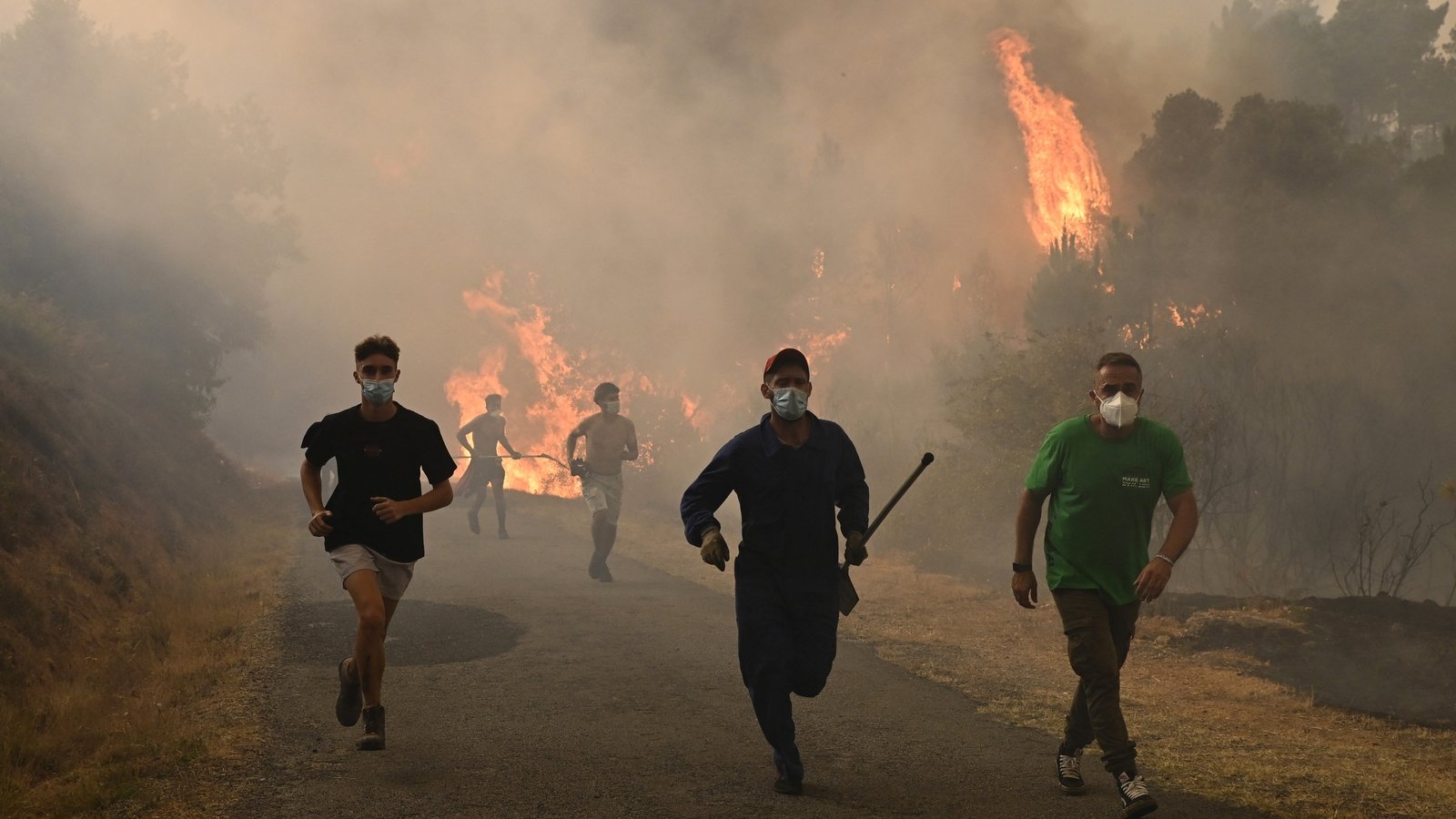The EU said today that it is working “non-stop” to support countries battling wildfires raging across European countries.
Extreme summer heat, which scientists say human-driven climate change is exacerbating, has fuelled blazes in Greece, Portugal, Spain and the Balkans.
Heat alerts have also been issued in Italy, France and England – and a climate expert today warned that we can expect these fires to move further north over time.
In some regions, firefighters are making strong gains – Turkey has reported a substantial reduction in blazes – while others, notably Spain and Greece, are still in the grip of a lethal and escalating crisis.
Spain has has been battling the blazes for ten days.
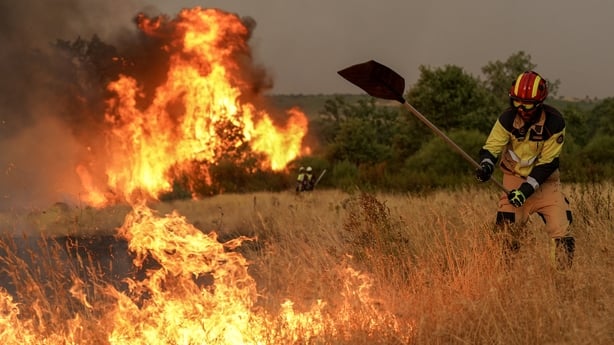
A firefighter works to extinguish a wildfire near Losacio, north of Zamora, in Spain
Fire has affected nearly 440,000 hectares in the eurozone so far in 2025, double the average for the same period of the year since 2006, according to the EU Science Hub’s Joint Research Centre.
Spain today mourned its third wildfire death this week, and activated an EU emergency facility to get help to tackle the blazes.
While Greece has been beating back a blaze threatening its third-largest city Patras as an unrelenting heatwave stoked tinderbox conditions in southern Europe.
Authorities across European countries have cited multiple causes for the massive fires, including careless farming practices, improperly maintained power cables and summer lightning storms.
But there have also been multiple reports of arson, including in Spain and North Macedonia, where rogue developers have been accused of deliberately starting blazes.
Lessons for Ireland
Climatologist John Sweeney, who is Emeritus Professor of Geography at Maynooth University, said that the Mediterranean Basin “is a major hotspot for climate change globally, as desiccation in summer months makes it vulnerable to ongoing fire damage”.
He told RTÉ News that “we can expect to see this spreading north as time goes on”, adding that there are “some signs of that already in France”, where there have been sporadic outbreaks of wildfire.
The wildfires ravaging Europe are “part and parcel of what we would expect to see” with “Sahara-like conditions being transformed and translocated further north in Europe” – a process which is driven almost exclusively by man-made climate change.
Prof Sweeney said that this has relevance for Ireland, where we already see some wildfires, although mostly gorse-related.
But he urged that we should not rule out the potential risk posed in this jurisdiction by reduced or insufficient forest cover.
EU response, Spain asks for help
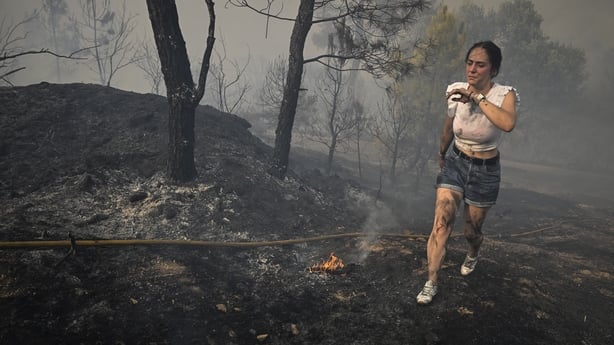
A woman caught in a wildfire near the village of Larouco, Spain
The EU said today that it is doing all it can to stop the blazes across the south of the continent.
“We continue non-stop to work on the support of affected countries,” spokeswoman Eva Hrncirova said.
“Fighting wildfires is mainly the task for the member states, but we are here to help them and to assist them with our civil protection mechanism,” she added.
Under the mechanism, EU member states offer help to other countries on the continent and Brussels pays for the operations. So far during the current fire season it has been activated 16 times.
Spain is availing of this support for the first time, and is being given two water bomber aircraft to help fight blazes in the worst hit areas.
The Spanish government has also raised its national emergency response level, preparing additional support for regional authorities overseeing multiple evacuations and highway closures.
Prime Minister Pedro Sanchez expressed condolences after the death of a firefighting volunteer in the hard-hit Castile and Leon region north of Madrid, where thousands have been displaced by evacuations.
“The wildfire situation remains serious, and taking extra precautions is essential,” Mr Sanchez wrote in an online post.
“Thank you, once again, to all those working tirelessly to fight the flames.”
Evacuation centres have been filled to capacity in parts of central Spain, as the most severe fires pushed northward into more rural areas, where some residents hosed the walls of their homes to try to protect them from fire.
Isabel Moreno, a meteorologist based in Madrid. said that at a time of year when temperatures of 32C might be expected they are climbing to 40C.
But she told RTE’s Today with Colm Ó Mongain: “We know how to manage these kind of temperatures”.
Greece
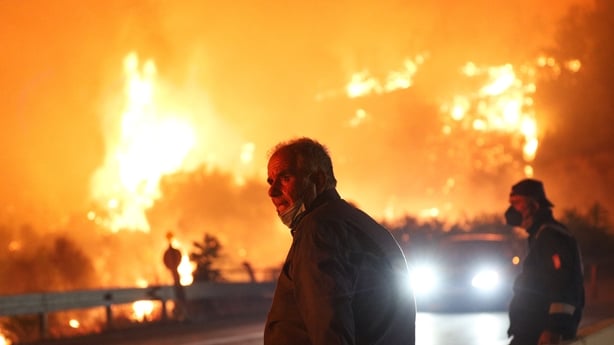
Emergency workers at a wildfire in Tsoukalaiika of Achaia, Peloponnese, Greece
Greece has been hard hit, as wildfires intensified right across southern Europe, after a night-long battle to protect the perimeter of the country’s third-largest city.
Greek firefighting resources have been stretched thin by relentless battles against multiple outbreaks following weeks of heatwaves and temperature spikes across the Mediterranean, and there is no sign of things easing up.
Outside the port city of Patras, firefighters struggled to protect homes and agricultural facilities as flames tore through pine forests and olive groves.
Tall columns of flames exploded behind apartment blocks on the outskirts of the city, while dozens of vehicles were torched as flames swept through a nearby impound lot.
“Today is another very difficult day with the level of fire risk remaining very high across many parts of the country,” a fire service spokesman said.
As water-dropping planes and helicopters swooped overhead, residents joined the effort, beating back flames with cut branches or dousing them with buckets of water.
On the island of Chios, exhausted firefighters slept on the roadside following a night-long shift.
Aircraft rotated between blazes on the western Greek mainland, the Patras area and the island of Zakynthos.
Balkans: Albania, North Macedonia, Montenegro
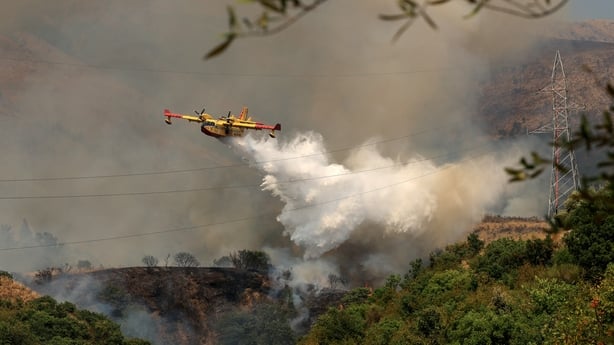
An Italian Canadair CL-415 aircraft drops liquid over a wildfire near the town of Delvine, Albania
Despite being under extreme pressure itself, Athens sent assistance to neighbouring Albania, joining an international effort to combat dozens of wildfires in the hard-hit nation.
An 80-year-old man died in one blaze south of the capital Tirana, officials said.
Residents of four villages were evacuated in central Albania near a former army ammunition depot.
In the southern Korca district, near the Greek border, explosions were reported from buried Second World War-era artillery shells.
Authorities said dozens of homes were gutted in a central region of the country.
Meanwhile, law enforcement officials in North Macedonia cited indications of arson, motivated by rogue developers.
Firefighters also struggled to contain a blaze at a nature reserve outside the capital Skopje.
The European Union has rushed aid to fire-hit countries, including non-member states, with ground crews and water-dropping aircraft, with much of it being concentrated on Montenegro, where major wildfires continued to burn in rugged areas near the capital Podgorica.
“Natural disasters know no borders,” Ljuban Tmusic, head of Montenegro’s civil protection agency, said.
“In Montenegro the resources we have … are clearly not enough.”
Turkey
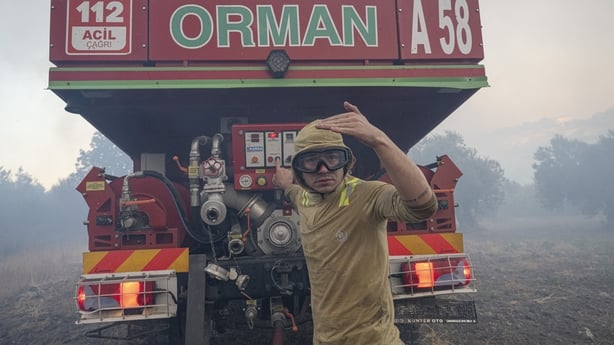
Turkish firefighters managed to extinguish the blaze in the Kepez region in Canakkale this week
A forestry worker was killed yesterday while responding to a wildfire in southern Turkey, officials said.
The Forestry Ministry said the worker died in an accident involving a fire engine that left four others injured.
Turkey has been battling severe wildfires since late June, and a total of 18 people have been killed, including 10 rescue volunteers and forestry workers who died in July.
However, things look better here than they do for Spain or Greece, with the government saying that most of the blazes have been contained, including a large fire in the northwestern province of Canakkale that forced hundreds to flee from their homes.
Both Canakkale airport and the Dardanelles Strait, which connects the Aegean Sea to the Sea of Marmara, were temporarily shut due to the wildfires on Monday. They have since reopened.
France, England
In France, which is recovering from massive recent fires in the southern regions, temperatures of up to 42C are expected for the third consecutive day.
Officials issued weather alerts giving local authorities discretion to cancel public events and cordon off areas with high fire risks.
Heat health alerts have also been extended into next week for much of England after the fourth heatwave of the summer brought thunderstorms and showers.
The UK Health Security Agency said yellow warnings will now be in place in Yorkshire and Humber, the East and West Midlands, London, the South East and South West and East of England until 6pm next Monday, 18 August.
The warnings mean significant impacts on health and social care services are possible due to high temperatures, including a potential rise in deaths among the elderly or those with pre-existing health conditions.
Alerts had been previously due to end at 6pm yesterday.
Gerard Mills is a physical geographer based at UCD.
He told RTÉ’s Today with Colm Ó Mongain that no evaporation occurs in cities, which pushes up temperatures.
People die in cities because of the heat usually die in their homes, he said, because they become too hot.
Going forward, he urged the use of a dual approach, reducing temperatures inside homes, and also in outdoor areas.
Additional reporting PA
